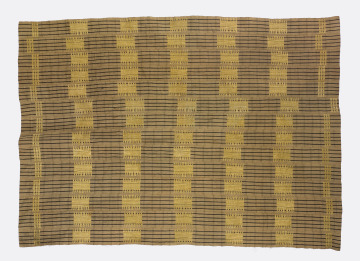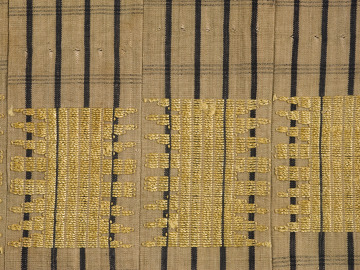Wrapper
- Culture
- Yoruba artist
- Date
- mid- to late 20th century
- Material
- Cotton, rayon
- Classification
- Costume & clothing, textiles
- Collection
- Arts of Africa, Oceania, and the Americas
- Current Location
- Not on view
- Dimensions
- 75 x 53 in. (190.5 x 134.6 cm)
- Credit Line
- Gift of Thomas Alexander and Laura Rogers
- Rights
- Contact Us
- Object Number
- 190:2011
NOTES
This wrapper is made of fourteen woven strips of fabric. Traditional Yoruba weavings often begin with indigenous cotton spun and dyed by women. The yarns are then woven into strips of cloth by men, and the strips are stitched together by women to form the completed garment. Changes in fashion and taste provide a wealth of abstract decorative patterns which are frequently named after political leaders or proverbs. While incorporating contemporary influences, the cloth has powerful traditional roots.
Traditional Yoruba women’s dress consists of three matching pieces: the waist wrapper, usually made of twelve to sixteen strips that are approximately two yards in length, and the top wrapper of eight strips. The head tie of multiple strips is worn as a turban. Strip-woven cloth, once the privilege of the ruling class, is worn by all adult Yoruba people for ritual and ceremonial occasions today.
Provenance
- 2007
Souleymane Bagayoko, Cinncinati, OH [1]
2007 - 2011
S. Thomas Alexander III and Laura Rogers, St. Louis, MO, purchased from Souleymane Bagayoko [2]
2011 -
Saint Louis Art Museum, given by S. Thomas Alexander III and Laura Rogers [3]
Notes:
[1] Deed of gift dated December 30, 2011 [SLAM document files].
[2] See Note [1].
[3] See Note [1]. Minutes of the Collections Committee of the Board of Trustees, Saint Louis Art Museum, February 27, 2012.
Souleymane Bagayoko, Cinncinati, OH [1]
2007 - 2011
S. Thomas Alexander III and Laura Rogers, St. Louis, MO, purchased from Souleymane Bagayoko [2]
2011 -
Saint Louis Art Museum, given by S. Thomas Alexander III and Laura Rogers [3]
Notes:
[1] Deed of gift dated December 30, 2011 [SLAM document files].
[2] See Note [1].
[3] See Note [1]. Minutes of the Collections Committee of the Board of Trustees, Saint Louis Art Museum, February 27, 2012.
We regularly update records, which may be incomplete. If you have additional information, please contact us at provenance@slam.org.

